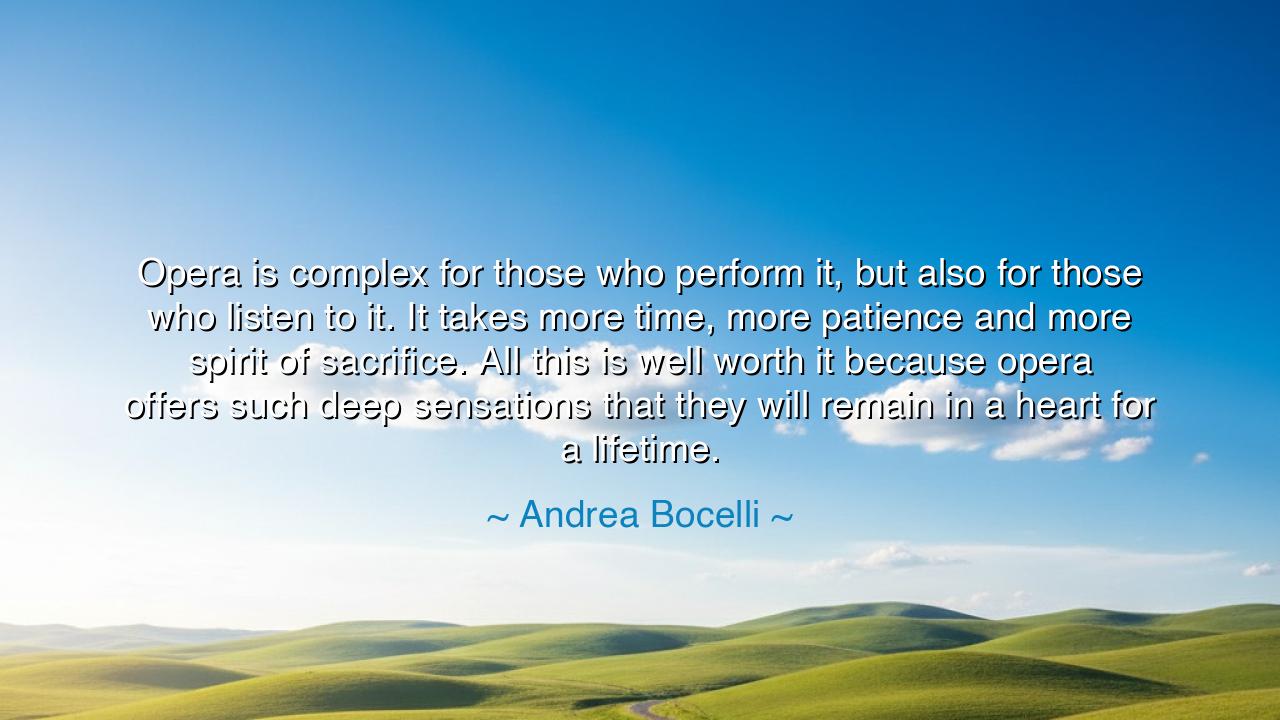
Opera is complex for those who perform it, but also for those
Opera is complex for those who perform it, but also for those who listen to it. It takes more time, more patience and more spirit of sacrifice. All this is well worth it because opera offers such deep sensations that they will remain in a heart for a lifetime.






The words of Andrea Bocelli, the blind tenor whose voice has touched the souls of millions, are a hymn to endurance, beauty, and the human spirit: “Opera is complex for those who perform it, but also for those who listen to it. It takes more time, more patience and more spirit of sacrifice. All this is well worth it because opera offers such deep sensations that they will remain in a heart for a lifetime.” In this reflection, he speaks not only of opera, but of life itself — a journey that demands discipline, patience, and sacrifice, yet rewards us with treasures that endure forever in the heart.
The meaning begins with complexity. Opera is not easily grasped, for it combines many arts into one: music, drama, poetry, and stagecraft. To the performer, it demands technical mastery, emotional depth, and physical stamina. To the listener, it requires openness, attention, and endurance. Unlike fleeting entertainments, opera cannot be consumed casually; it asks that one enter into its world with commitment. Bocelli’s words remind us that what is most profound in life often requires us to go beyond the surface, to invest time and energy in order to truly receive its gifts.
He emphasizes the need for time, patience, and sacrifice. No great art, no deep experience, no true love can flourish without these. For the singer, hours of training lie behind a single aria. For the audience, hours of listening and openness are required to understand the story unfolding in music and voice. In a world that craves instant gratification, Bocelli’s words are a gentle rebuke, calling us back to the ancient truth: that which is worth the most often costs the most.
The origin of Bocelli’s insight lies in his own journey. Blinded at a young age, he turned to music as his refuge and his calling. Opera was not easy for him, nor was life itself. Yet through discipline and devotion, he became one of the world’s greatest interpreters of this art. His success was born of patience and sacrifice, but also of joy — the joy of experiencing and sharing the “deep sensations” that opera alone can provide. Bocelli speaks as one who has paid the price of discipline and reaped the eternal reward of beauty.
History echoes this wisdom. Think of Beethoven, who, though deaf, composed symphonies of unmatched power, each note a triumph of sacrifice and patience over despair. Or recall Maria Callas, whose dedication to opera demanded enormous sacrifice of her personal life, yet whose voice remains etched in the memory of countless hearts. The beauty they gave was not free; it was purchased with discipline, endurance, and even suffering. Yet their gifts endure far beyond their lifetimes.
The lesson for us is clear: if we desire deep sensations — experiences that shape the soul and remain within us forever — we must be willing to cultivate patience, to give time, to make sacrifices. This applies not only to opera but to every noble pursuit: relationships, faith, craftsmanship, and personal growth. That which is shallow may amuse for a moment, but that which is deep will nourish the heart for a lifetime.
Practical actions follow naturally. When you encounter something difficult — be it a skill, a relationship, or a work of art — resist the temptation to abandon it. Instead, give it time. Practice patience. Allow yourself to be stretched by the discipline it requires. In doing so, you will discover that sacrifice is not a loss but an offering, a door that opens to lasting joy. Whether through music, learning, or love, choose depth over ease, and the reward will be eternal.
Thus, Bocelli’s words resound as a timeless teaching: opera, like life, demands patience and sacrifice, but offers eternal beauty in return. Let us then embrace complexity, endure with patience, and sacrifice willingly for that which is noble, for in so doing we gain treasures that will echo in our hearts for all the days of our lives.






AAdministratorAdministrator
Welcome, honored guests. Please leave a comment, we will respond soon